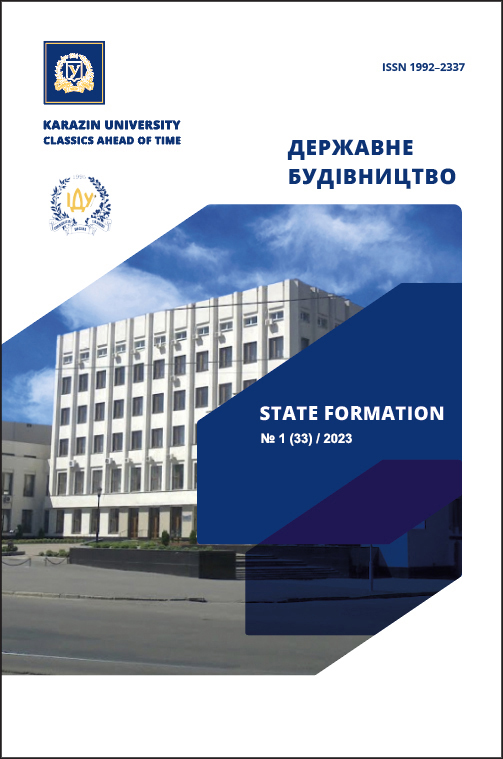INITIALIZATION OF CIVIC IDENTITY OF YOUTH IN PUBLIC ADMINISTRATION
Abstract
The paper considers the signs of initialization of the civic identity of young Ukrainians, which give grounds to believe that the problems of its preservation and reproduction should be the focus of scientific discourse.
Two different axes of civic identity have been identified, which is particularly relevant under conditions of black and white shades of russia's war against Ukraine: from congruence to disjuncture. It has been substantiated that young people build a civic identity from the available materials, and these materials are different for young people from different communities. Civic tendencies of young people are based on their everyday experience in certain social, economic, institutional, political and historical contexts. It has been proven that actors involved in the process of building a civic identity should develop practices encouraging young people to struggle with both congruence and the disjuncture they experience, and ensuring a more meaningful civic education that helps young people to construct critical but engaged civic identities.
It has been found that civic identity is an incentive for active participation of citizens in public administration, strengthening social consolidation and supporting the stability of the country.
The conditions for creating an enabling environment for young people to influence the decisions and policies that affect them have been studied.
The need to implement the UN strategic priority – the "Generation Unlimited" motto – has been emphasized, and it has been shown that young people face stigma associated with their traits and impact on society. The stigma fuels policies that marginalize young people and call for safety measures against them, rather than promoting more favourable solutions that allow them to participate positively in the life of society.
It has been substantiated that the participation of young people in public administration is also represented in their involvement in decision-making processes that influence their lives through school boards, student unions, youth clubs, national youth parliaments, regional and international youth forums and advisory councils of international organizations.
Downloads
References
Leps' song was loudly listened to in the center of Lviv: details about the participants in the scandal surfaced. https://www.unian.ua/society/guchno-sluhali-pisnyu-lepsa-u-centri-lvova-splivli-podrobici-pro-figurantiv-skandalu-video-novini-lvova-12250902.html
Petrovska I.R. Types of civic identity of student youth. Problems of modern psychology. 2016. Issue 31. 32-43.
Tretyak Ya. Formation of the civic identity of youth: theoretical contours of the problem. Ensuring sustainability, revitalization and development of territories and communities in Ukraine: scientific and practical materials. conf. for international participation, Dnipro, May 4, 2023 / by general ed. I. Chikarenko; T. Mamatova. Dnipro: NTU "Dniprov Polytechnic", 2023. 257 p. 212-215.
93% of respondents believe in their abilities. Young people who are currently staying in Ukraine make this choice quite consciously, even if their current experience is extremely difficult. Visit Ukraine. https://visitukraine.today/uk/blog/1861/yak-zminilas-ukrainska-molod-pid-cas-viini-ta-cogo-pragnut-pidlitki
A Guide to UN Security Council Resolution 2250, United Nations of Youth http://unoy.org/wp-content/uploads/Guide-to- SCR-2250.pdf.
Article 12 of the United Nations Convention on the Rights of the Child enshrines participation as a fundamental human right. https://www.ohchr.org/en/instruments-mechanisms/instruments/convention-rights-child
Bennett, W. L., D. Freelon and C. Wells, Changing Citizen Identity and the Rise of a Participatory Media Culture, Handbook of Research on Civic Engagement in Youth, edited by L. R. Sherrod, J. Torney-Purta and C. A. Flanagan, John Wiley & Sons, 2010. 393–423.
Carnegie United Kingdom Trust, ‘Empowering Young People: The final report of the Carnegie Young People Initiative. 2008.
Cho, Byrne and Pelter.2020. Digital Civic Engagement by Young People. https://www.unicef.org/media/72436/file/Digital-civic-engagement-by-young-people-2020_4.pdf
Coalition for Adolescent Girls. Partners and Allies Toolkit: Toolkit for meaningful adolescent girl engagement. December 2015.
DUF: The Danish Youth Council. https://en.duf.dk/about-duf/.
Gaventa, J. Towards Participatory Governance: Assessing the transformative possibilities, in Participation: From tyranny to transformation, edited by Samuel Hickey and Giles Mohan, Zed Books, London, 2004. 25–41.
Hart, D., et al. High School Community Service as a Predictor of Adult Voting and Volunteering. American Educational Research Journal, vol. 44, no. 1, 2007. 197–219.
Keating, A., and J. G. Janmaat, Education through Citizenship at School: Do school activities have a lasting impact on youth political engagement? Parliamentary Affairs, vol. 69, no. 2, 2015. 409–429.
Martin, S., et al. An Examination of Children and Young People’s Views on the Impact of their Participation in Decision-Making, Department of Children and Youth Affairs, Ireland, 2015.
O’Kane, C., Children and Young People as Citizens: Partners for social change, Save the Children South and Central Asia, 2003.
Resolution adopted by the United Nations General Assembly, A/RES/68/130, 18 December 2013. https://undocs.org/en/A/ RES/68/130.
Resolution adopted by the United Nations Human Rights Council. Youth and Human Rights. A/ HRC.32/L.1, 28 June 2016. https:// undocs.org/A/HRC/32/L.1.
Simpson, G. The Missing Peace: Independent Progress Study on Youth, Peace and Security, United Nations Security Council, A/72/761-S/2018/86, 2 March 2018, 2.
Tatum, J. We Need Their Help: Encouraging and discouraging adolescent civic engagement through photovoice. Children and Youth Services Review, vol. 34, 2012. 2247–2254.
United Nations Development Programme, Enhancing Youth Participation Throughout the Electoral Cycle: A good practice guide, New York, January 2013.
United Nations Educational, Scientific and Cultural Organization, Progress on Education for Sustainable Development and Global Citizenship Education, UNESCO, Paris, 2018.
United Nations, Transforming Our World: The 2030 Agenda for Sustainable Development, para. 51, Sustainable Development Goals Knowledge Platform. https://sustainabledevelopment.un.org/post2015/transformingourworld.
World Bank, World Development Report 2007: Development and the next generation, World Bank, Washington, D.C., 2006.

